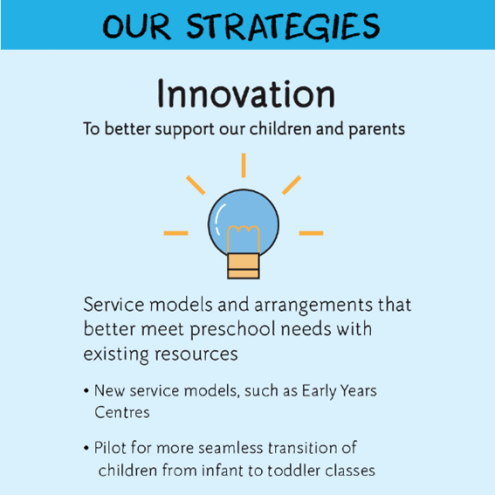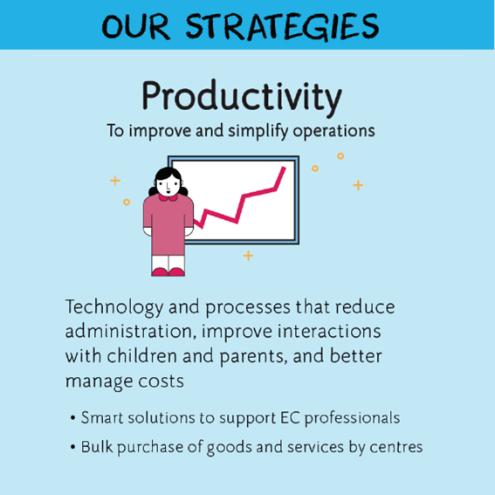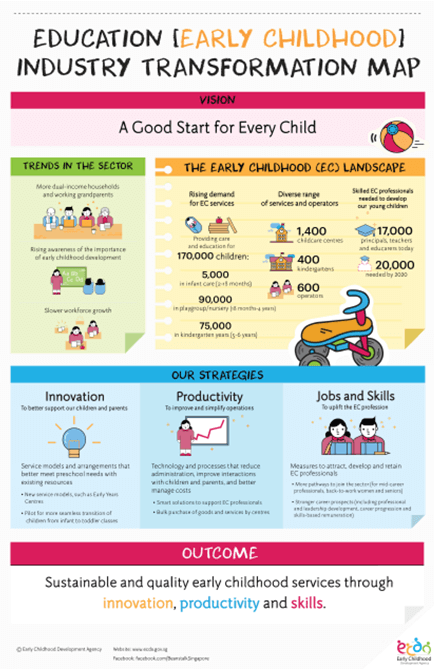Early Childhood Industry Transformation Map

About the Early Childhood Industry Transformation Map (ITM)
The ITM is a roadmap to steer the early childhood sector towards more innovation and productivity, so as to better cater to rising demand for quality early childhood services.
The ITM is one of the announcements made by the Ministry of Social
and Family Development at the 2018 Committee of Supply debates.
Ensuring sustainable and quality early childhood services
Currently, there are about 17,000 educators in the early childhood sector. With more dual-income families and working grandparents, as well as growing awareness of the importance of early childhood development, there is rising demand for preschool services, and the sector will require 20,000 early childhood educators by 2020.
The Early Childhood ITM encapsulates initiatives co-developed by the Early Childhood Development Agency (ECDA), the Association of Early Childhood and Training Services (ASSETS), the unions, SkillsFuture Singapore (SSG) and preschool operators, to meet the need for quality manpower in a sustainable manner.
The ITM sets out three key strategies to support the growth of the sector:
1. Innovative services – to better support parents and children

ECDA will study and introduce innovative services to better meet the needs of parents and children, while easing the transition between different service types. For example, the Early Years Centres in partnership with Ministry of Education (MOE) Kindergartens is a new service model to meet the needs of more parents for early years services, while ensuring a smoother transition to a nearby MOE Kindergarten (MK).
ECDA is also piloting with several preschools the co-sharing of spaces for infants and toddlers, which are typically segregated. This can potentially smoothen the transition for young children across age groups and enable operators to enroll more infants and toddlers, while ensuring that children are adequately supervised and the prevailing regulatory requirements are adhered to.
2. Productive processes – to improve and simplify operations

Work processes are being streamlined to help operators manage costs and allow educators to devote more time to teach and care for our children. Building on the good progress made in deploying IT solutions to aid day-to-day processes (e.g. attendance and temperature-taking) in preschools, the Association of Early Childhood and Training Services (ASSETS) and its partners are also piloting the use of shared or centralised services, to help preschool operators better manage costs. This includes catering and bus services, and demand aggregation across different operators for common items such as stationery and learning resources.
3. More jobs with a focus on skills – to grow and uplift the profession

ECDA will expand opportunities for passionate individuals with the right aptitude to join the growing early childhood profession. We have introduced more flexible forms of training – for example, more on-the-job coaching and shorter classroom-based training for Allied Infant Educarers (AIEs) to care for babies. To ensure quality care, the AIEs will be supported and guided by experienced mentors. Through such efforts, we aim to attract more locals, including mid-career professionals, back-to-work mothers and seniors, to the early childhood sector.
ITM Infographic

You may also like

From Cabin to Classroom: Journey of an Outstanding Early Childhood Educator
The PDP modules allowed me to get creative with lesson ideas and keep up with the ever-changing Early Childhood sector.

Ms Farhana Binte Mohamed Hassan
Early Years Educator - PCF Sparkletots @ Pioneer Block 987D (CC)

More Than Just a Place for Food
Young children are highly inquisitive, and learn most effectively with activities that allow exploration and experimentation.

Kinderland @ Yio Chu Kang

Little Fingers Create Great Art - A Community Project by Kinderland and Skool4kidz
I believe this collaborative effort is a very meaningful contribution to the SG50 celebrations.

Kinderland and Skool4Kidz